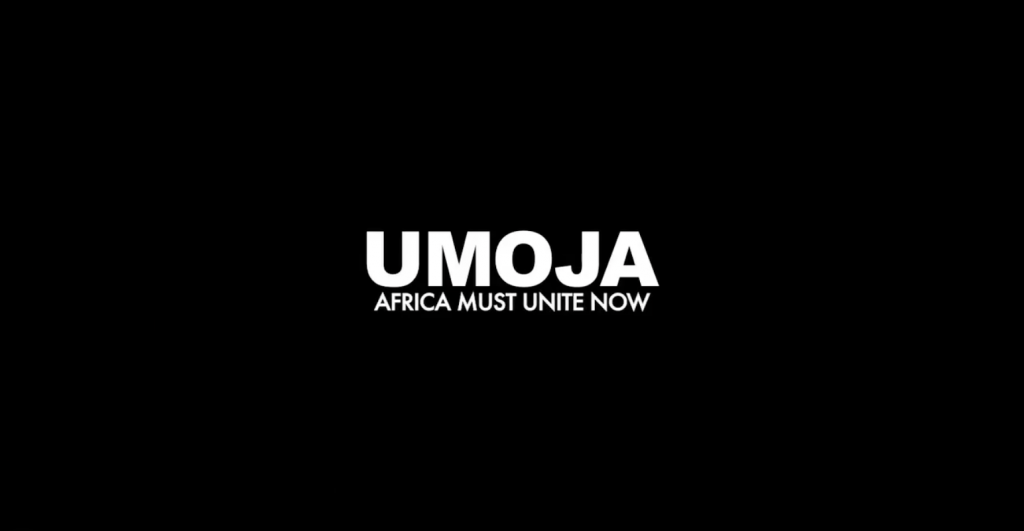“Black lives matter! Africa must unite! Africa must unite! Black lives matter!”
Umoja: Africa Must Unite
Assessing the state of “pan-Africanism” in 2021 is no simple task. An agreed-upon definition is nearly impossible. There are even some (increasing) circles that find the topic either irrelevant or of no continuing importance to any advancement of those comprising a diaspora they do not even recognize. It is against this backdrop that Umoja: Africa Must Unite Now, from “Principle Investigator” Dr. Mjiba Frehiwot, enters and attempts to offer some powerfully clarifying perspective. And it does.
Umoja does not select any particular approach to pan-Africanism. The film’s task is far more introductory allowing the entire African world to feel welcome, home, and able to adjust to their particularities which form to adopt. That is, Umoja is not dogmatic nor does it emanate from any one organizational home. The film does well to teach or remind of the various approaches taken or forms pan-Africanism has been molded to satisfy any given historical moment.
Importantly as well, Umoja is produced by a true adherent to pan-Africanism and one very much engaged with the diaspora. Dr. Frehiwot has lived, taught, and organized on multiple continents and works tirelessly throughout the diaspora and it shows well in the film. Her specific definition of or approach to pan-Africanism is reflected, but does not dominate, as a broad genuine interest in the history of pan-Africanism drives what is ultimately an all-too-rare occurrence in media production of this nature; that it be produced by actual supporters of, or adherents to, the politics discussed therein.

Umoja offers a broad scope and definition of pan-Africanism leaving room to include nearly all Black World attempts to organize the diaspora beyond the geopolitical boundaries and identities imposed by European imperialism. This is essential today in an era of heightened opposition to all forms of radicalism and pan-Africanism in particular. So much is encouraged today that is the complete and mirrored political opposition to all forms of Solidarity Of Dispersed Africans (#SODA). Such a reactionary political climate confers heightened importance and power to the film. And yet, this is not Umoja’s most important contribution.
It could be argued, and with strong evidence to support the claim, that Umoja’s most important gift is its inclusion, even emphasis on, the role African women play in pan-Africanist struggle; now and historically. This is done with no grand pronouncement necessarily, just an accurate depiction of the history and, again, a depiction that comes from a true pan-African/pan-Africanist woman of the diaspora. The point perhaps does today need to be made overtly but Umoja’s more subtle delivery of that same message works perfectly well. Women, again, then and now, are heard well in their continued role/leadership in developing pan-Africanist consciousness and movement. But, indeed, this still too is not Umoja’s most important contribution.
What defines Umoja as pivotal is a simple, but powerful, inclusion (centrality) of continental Africans speaking on the importance of pan-Africanism. While pan-Africanism is largely considered (with some notable dispute) to have emerged outside of the continent and among those in the diaspora, and while today, critics of pan-Africanism often like to decry the absence of continental Africans among pan-Africanists, Umoja easily dispels this dangerous myth. The way Umoja does this myth-busting is equally simple as it is earth-shattering: By speaking directly with continental Africans with no inducement to anti-African perspectives, Dr. Frehiwot destroys the mediation on pan-African discussions imposed by Western, corporate, capitalist media. In so doing, the audience is left not only with an all-encompassing overview of the history of pan-African movements but also the views of contemporary, active, and pan-Africanist Africans from the continent, as well as, the entire Black World.
To contend that this view from the continent defined Umoja’s dominant power is to be cognizant of how African people today are most often encouraged to engage; via exchanges designed by imperialism and carried via commercial media, or mediated via university campuses, or forced into competition with one another at the bottom of the global economic order.